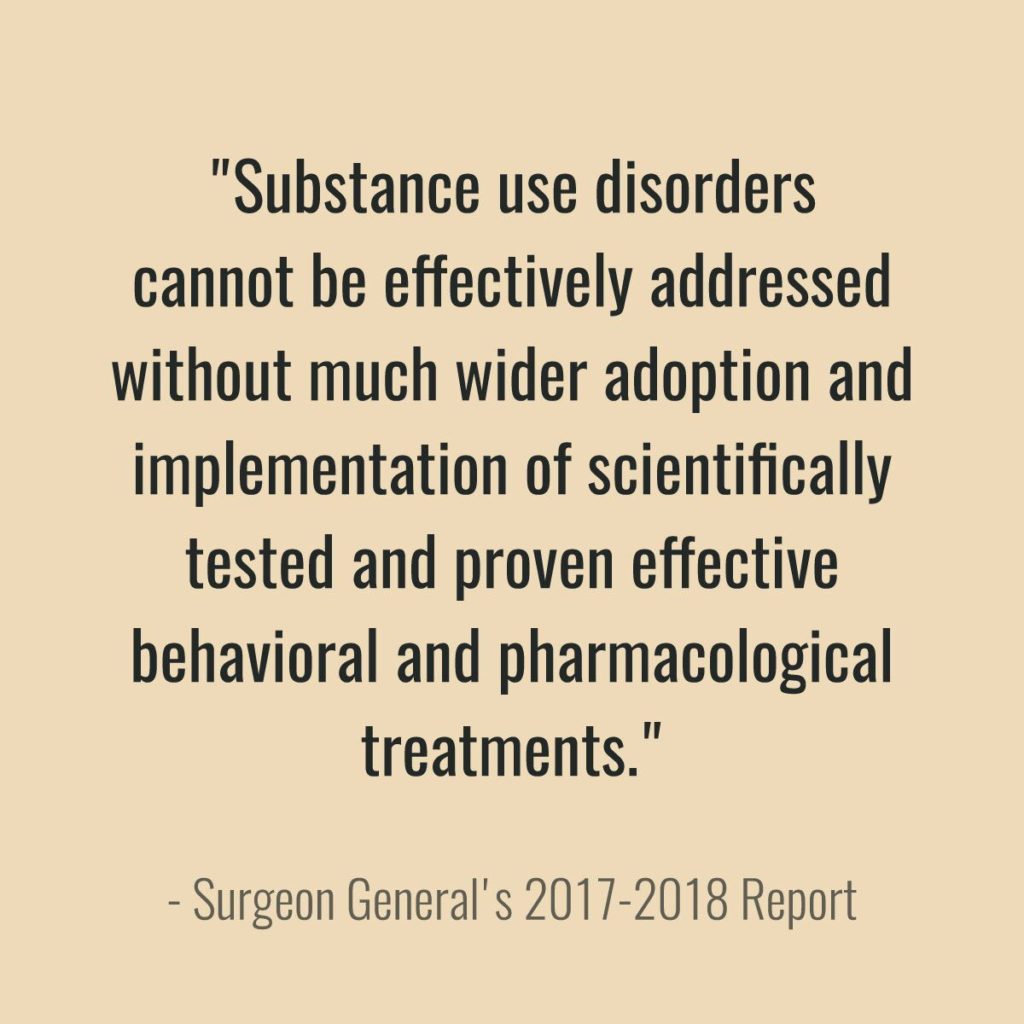The United States Department of Health & Human Services recently released a report titled “Facing Addiction in America: The Surgeon General’s Report on Alcohol, Drugs, and Health.” Echo Recovery applauds the Surgeon General’s office for providing this frank, commonsense report on the state of alcohol and drug abuse in the United States. The ongoing opioid crisis in America continues to impact the lives of Americans in every community, in every state, in every part of the country. This report supplies hard data and facts to hopefully drive awareness about issues like alcoholism, drug abuse, and opioid addiction in the country.
The Report And Statistics on the Opioid Crisis
This report is a breath of fresh air in a conversation about addiction that has seen many missteps in recent years. The current administration understands addiction, its effects on American communities, and what proper treatment should entail. As we begin 2018, the Surgeon General’s report is a fantastic resource for starting conversations about how to address the opioid epidemic in 2018 and beyond. The U.S. Department of Health and Human Services states that this report should help individuals, organizations, and their communities recognize the threat of addiction and lessen its impact on their lives. The report is divided into five parts, and each portion addresses different facets of the addiction problem in the United States.
The Neurobiology Of Addiction
One of the major misconceptions surrounding addiction is that drug use is always a choice. This thinking contributes to the social stigma surrounding drug abuse and addiction and is more harmful than helpful. It’s easy to say that people simply shouldn’t use drugs, but this doesn’t account for one of the major contributing factors to the ongoing opioid crisis: prescription medications taken for legitimate medical issues. The Surgeon General’s report states that addiction to drugs or alcohol is a chronic brain disease – not a choice – and it is a disease with potential for recovery or later relapse and recurrence.
Peer-reviewed scientific evidence supports the claim that addiction is a brain disease. Addiction disrupts brain function in three major areas, the basal ganglia, extended amygdala, and the prefrontal cortex. Damage to these areas of the brain due to drug use interferes with the individual’s decision-making processes, responses to environmental stimuli, feelings of pleasure and reward, and stress sensations. It’s important to remember that these issues do not simply go away after stopping drug use. Brain damage of this type can last for several years after achieving sobriety or even be permanent.
This portion of the report indicates that addiction inflicts measurable physical harm to an individual’s brain and should serve as an indication that once addiction sets in, it is certainly no longer a choice for the affected individual. Understanding the neurobiological implications of addiction is an important step in devising new, more effective methods for treating addiction.
Addiction Prevention Programs And Policies
The addiction government report also includes findings on the effectiveness of various addiction prevention programs and public policies. While some policies such as the prescription drug buyback programs and prescription monitoring systems have reported substantial success, other programs and policies haven’t had as much of an impact. As of 2018, there are still very few solid findings concerning inappropriate opioid medication prescribing practices.
Several federal, state, and local-level policies aim to reduce the availability of alcohol in some areas and increase public awareness of the dangers of alcoholism and drunk driving. Many states have cracked down on drunk driving, and increased penalties for violators, to deter other drivers from taking dangerous risks. Since the 1980s, alcohol-related vehicle deaths have dropped almost by half since the implementation of these policies.
Many community programs aim to address their most high-risk areas and community members to build sustainable prevention measures. These programs often serve citizens across all populations and age groups and address their specific problems that could otherwise lead to addiction.
Addiction Recovery Programs and Treatment Paths
 The Surgeon General’s report also contains inspiring data showing the effectiveness of many recovery options. Supported scientific evidence reports that about 25 million Americans (about 50% of American adults), who once met the criteria for a substance abuse disorder diagnosis, are currently in stable remission for one year or longer. This data shows that the available recovery options in the United States are working, and increasing advocacy, awareness, and the availability of these recovery options should be a top priority in many American communities.
The Surgeon General’s report also contains inspiring data showing the effectiveness of many recovery options. Supported scientific evidence reports that about 25 million Americans (about 50% of American adults), who once met the criteria for a substance abuse disorder diagnosis, are currently in stable remission for one year or longer. This data shows that the available recovery options in the United States are working, and increasing advocacy, awareness, and the availability of these recovery options should be a top priority in many American communities.
Americans have a wide variety of recovery options at their disposal, from inpatient rehab programs covered by employer-provided insurance to luxury-level recovery resorts. The different recovery options available in the United States have form a robust network of support for people struggling with addiction. People from all walks of life can receive addiction treatment and leave with access to a vast support system.
Healthcare Systems And Addiction
One of the most salient points of the Surgeon General’s report is the fact that divisions between mental healthcare and substance abuse treatment in the past have hindered recovery for many Americans. Widely-supported scientific evidence shows that mental health and addiction are closely related, and many new addiction cases qualify as “dual diagnoses.” A dual diagnosis is a case involving one patient with a mental health issue and a substance abuse disorder occurring simultaneously.
The report indicates that integration of mental health services in substance abuse recovery, and making substance abuse recovery resources more readily available through healthcare providers, are fantastic developments that have had very positive results for many people struggling with mental health issues and substance abuse.
Suggestions For Future Addiction Prevention and Treatment
The Surgeon General’s report ends with several recommendations for fighting addiction in 2018 and beyond. One of the most important points made is that changing the cultural perception of addiction is absolutely crucial to improving recovery rates and slowing the rate of new addiction cases. By making addiction more of a socially acceptable topic, people who need substance abuse treatment will be more receptive to entering rehab or exploring their recovery options.
The report also suggests that community stakeholders need to address addiction in their communities however possible, from investing in new community programs and advocacy initiatives to donating to substance abuse treatment facilities. Ultimately, starting more conversations about drug abuse and addiction will help reshape public perceptions about these issues and hopefully encourage the people who need help to seek it.
A Hopeful Sign For The Future
This report is a good indication that the current administration is committed to fighting the opioid crisis and addiction rates in the United States. The policies and suggestions for 2018 addiction treatment practices contained in the report show that this administration truly understands addiction and its effects on Americans. American citizens should feel hopeful that the next three years of the current administration will contain more progress toward stopping the opioid crisis and making substance abuse recovery a more accessible option for the people who need it.
Join The ECHO Recovery Movement By Donating
Jenny Weatherall is the co-owner and CEO of Eminent SEO, a design and marketing agency founded in 2009. She has worked in the industry since 2005, when she fell in love with digital marketing… and her now husband and partner, Chris. Together they have 6 children and 3 granddaughters.
Jenny has a passion for learning and sharing what she learns. She has researched, written and published hundreds of articles on a wide variety of topics, including: SEO, design, marketing, ethics, business management, sustainability, inclusion, behavioral health, wellness and work-life balance.


